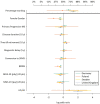Comparison of employment among people with Multiple Sclerosis across Europe
- PMID: 35496757
- PMCID: PMC9052831
- DOI: 10.1177/20552173221090653
Comparison of employment among people with Multiple Sclerosis across Europe
Abstract
Background: People with Multiple Sclerosis (PwMS) suffer from an increased risk of unemployment during the course of the disease. In recent years progress has been made in increasing the time until patients have to leave the workforce permanently. Such a retirement is often associated with MS but the driving factors including disability progression, support measures at the workplace, and societal aspects are not yet fully understood.
Methods: We consolidated data from four European MS databases from Germany, Poland, Sweden, and the United Kingdom, which were able to provide data on working status, disability progression and quality of life in accordance with the data harmonization framework of the EUReMS (European Registry in Multiple Sclerosis) project.
Results: Factors strongly associated with unemployment are disability progression, low quality of life and being close to the statutory retirement age. Overall, highest employment rate (77%) and lowest effects of gender and disease duration were found in Sweden.
Conclusions: We found remarkable differences between the European registers and the countries studied, which may indicate inequalities at European level. Furthermore, our findings suggest that it is feasible and useful to combine data from different MS registers in Europe, albeit the data structures are heterogeneous.
Keywords: employment; harmonization; multiple sclerosis; registries.
© The Author(s), 2022.
Conflict of interest statement
Declaration of Conflicting Interests: The author(s) declared the following potential conflicts of interest with respect to the research, authorship, and/or publication of this article: DE, TP, RM, WB have nothing to disclose. JH has received honoraria for serving on advisory boards for Biogen, Bristol Myers Squibb, Sanofi-Genzyme, Merck KGaA, Novartis and Sandoz and speaker’s fees from Biogen, Novartis, Merck KGaA, Teva and Sanofi-Genzyme. He has served as P.I. for projects, or received unrestricted research support from Biogen, Bristol Myers Squibb, Merck KGaA, Novartis, Roche, and Sanofi-Genzyme. His MS research was funded by the Swedish Research Council and the Swedish Brain foundation. None resulted in a conflict of interest. AS has no personal pecuniary interests to disclose, other than being the lead of the German MS Registry, which receives funding from a range of public and corporate sponsors, recently including The German Innovation Fund (G-BA), The German MS Trust, German MS Society, Biogen, Bristol Myers Squibb, Merck, Novartis, Roche, and Sanofi. None resulted in a conflict of interest. CT is member of advisory boards of Merck, Novartis and the multi-sponsored “Brain Health Initiative” of Gavin Giovannoni. PF has received speaker’s fees and honoraria for advisory boards from Almirall, Bayer, Biogen Idec, Bristol Myers Squibb, Genzyme, Novartis, Merck-Serono, Roche and Teva. None resulted in a conflict of interest.
Figures



References
-
- Kornblith AB, La Rocca NG, Baum HM. Employment in individuals with multiple sclerosis. Int J Rehabil Res Int Z Rehabil Rev Int Rech Readaptation 1986; 9: 155–165. - PubMed
-
- Flachenecker P, Stuke K, Elias W, et al. Multiple Sclerosis Registry in Germany – Results of the Extension Phase 2005/2006. Dtsch Aerzteblatt Online [Internet]. 2008 Feb 15 [cited 2019 Dec 18]; Available from: https://www.aerzteblatt.de/10.3238/arztebl.2008.0113 - DOI - PMC - PubMed
-
- Baneke P. MSIF Survey on employment. 2010.
LinkOut - more resources
Full Text Sources

